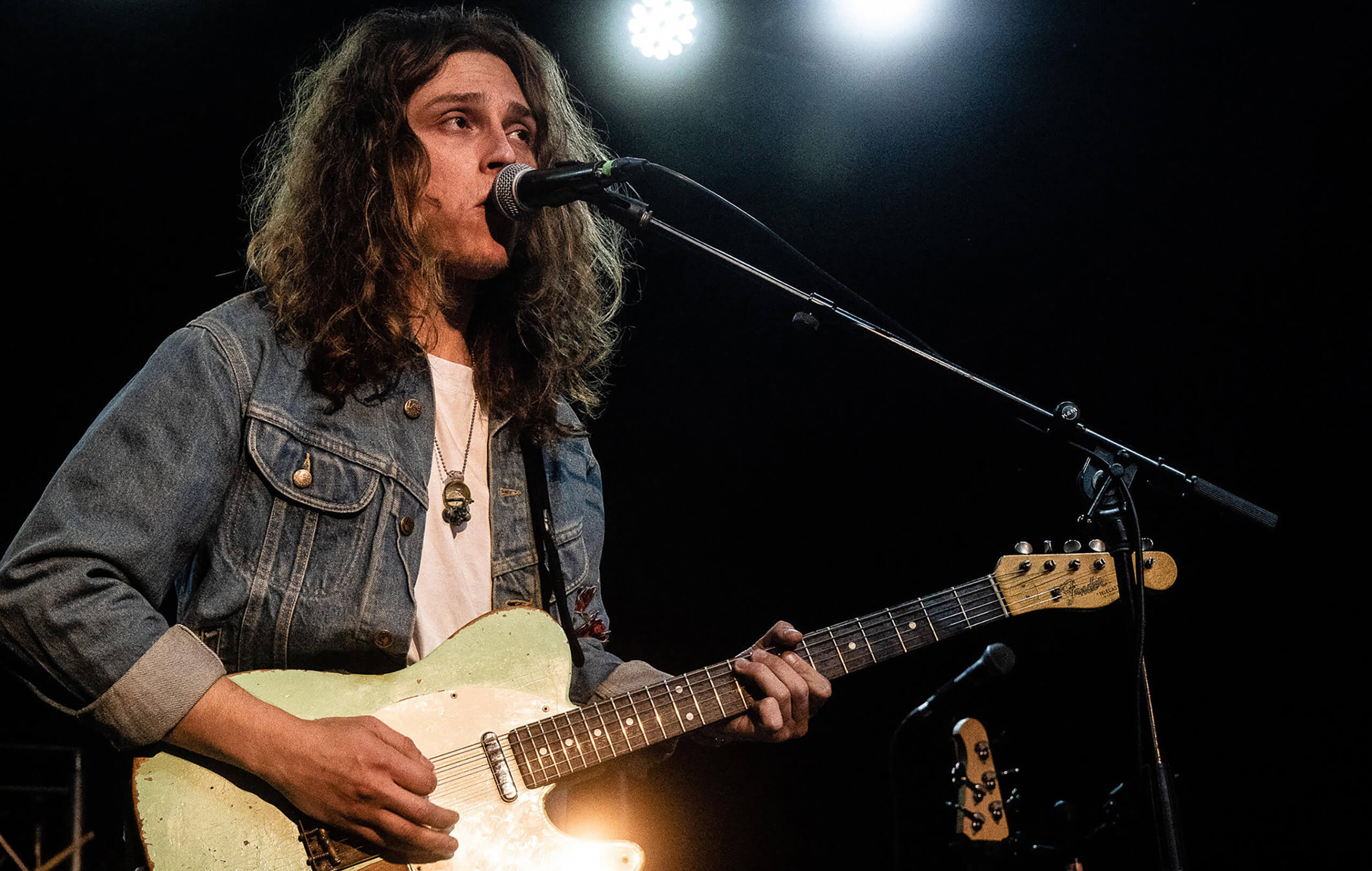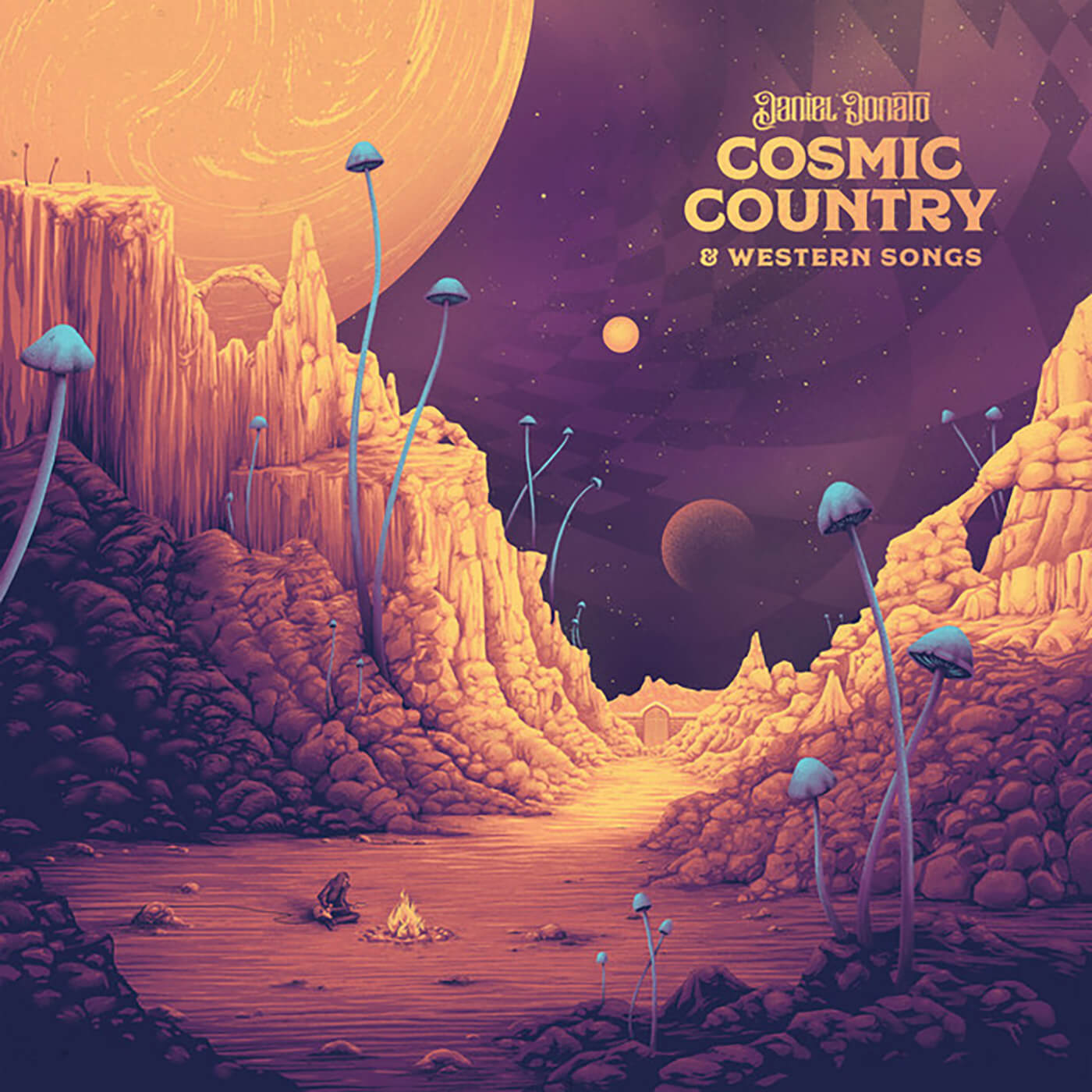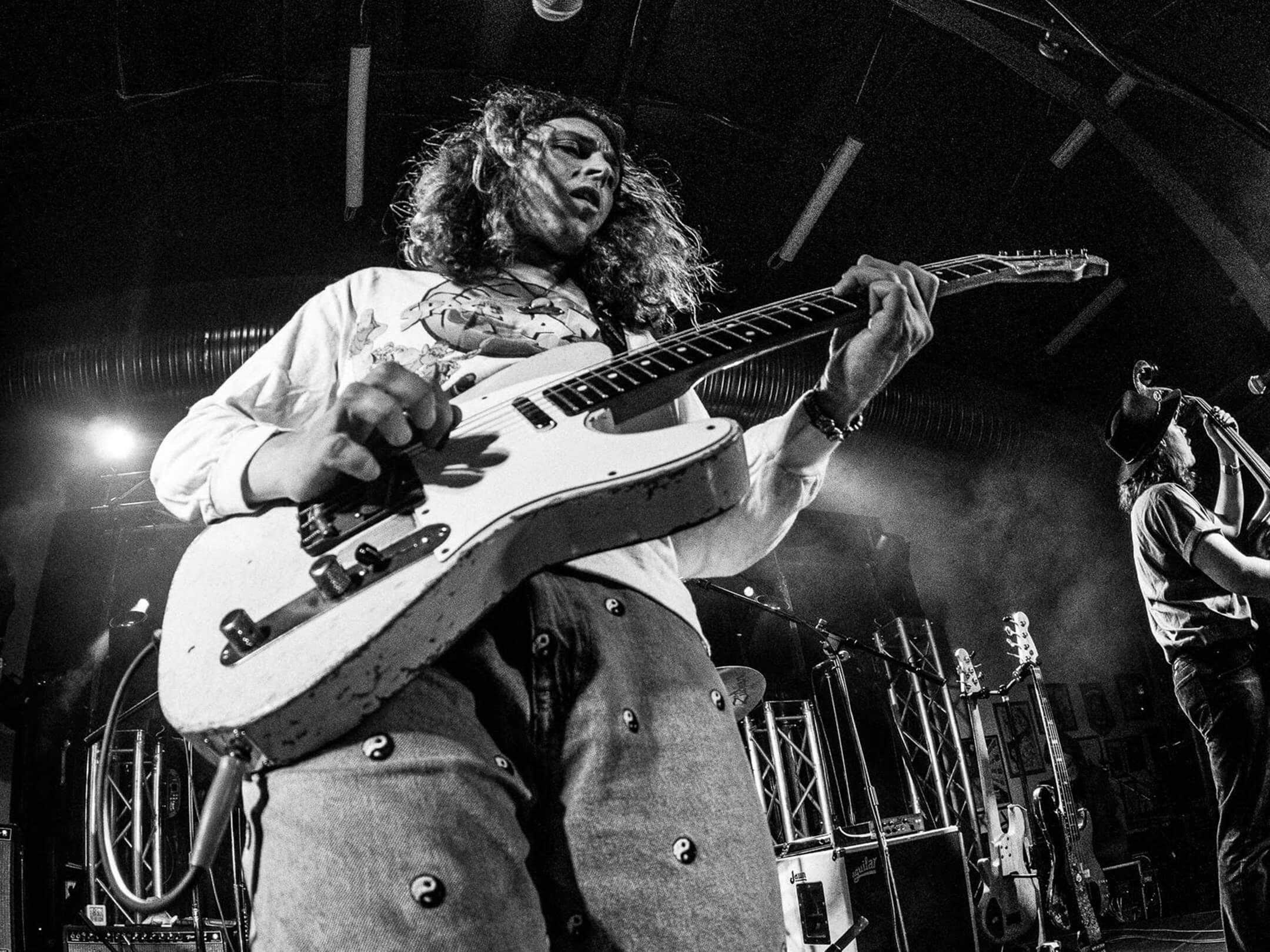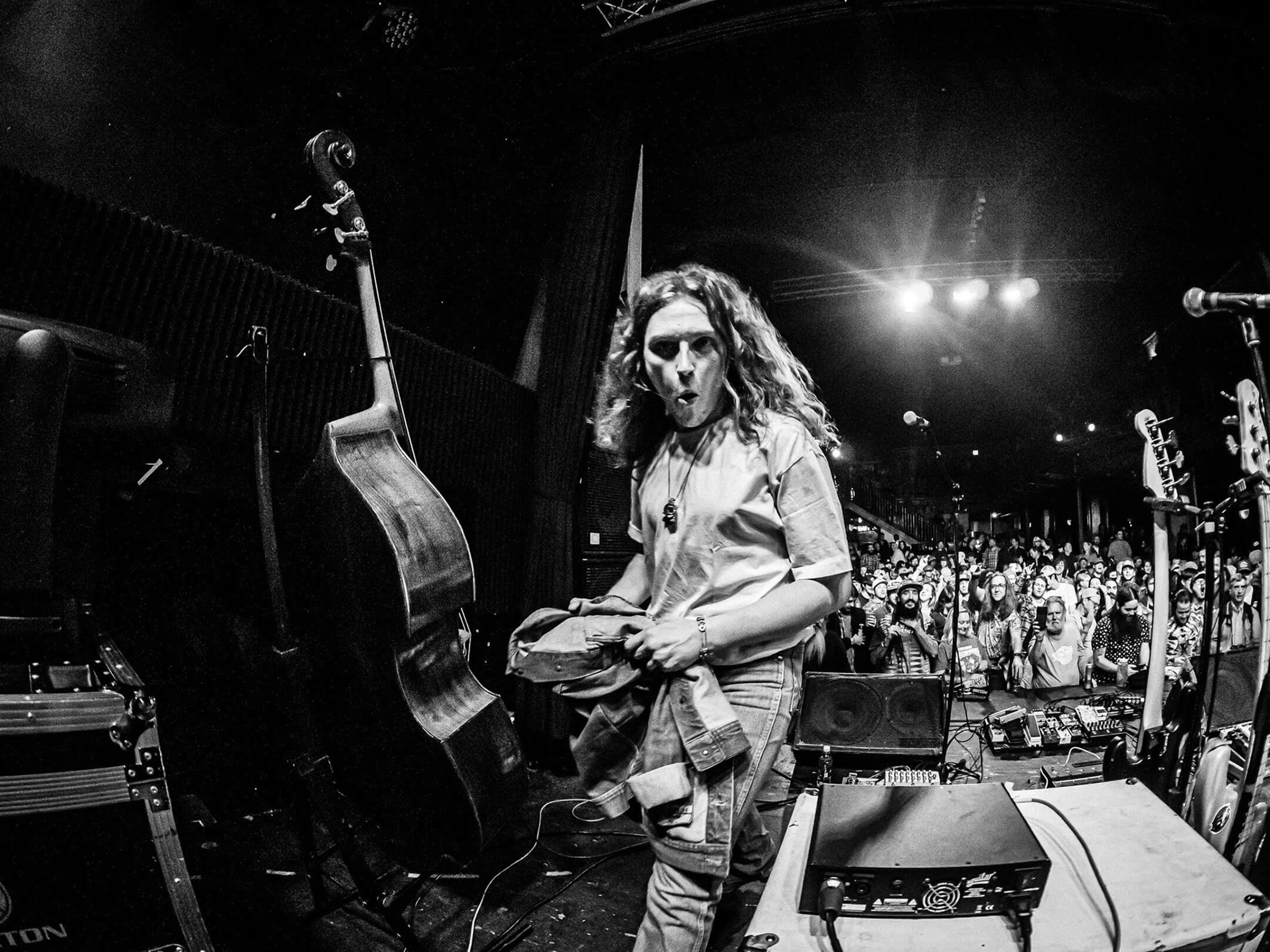Cosmic Country: Daniel Donato on perspective shifts, psychedelics and the shamanic potential of the musician
We talk to the Nashville native about what his Cosmic Country mantra truly means, mind-expansion of all kinds and, for reasons that do actually become apparent, the 1971 film Willy Wonka And The Chocolate Factory.

Image: Ant Braaten
Hopping in a pickup and driving out to Middle-Of-Nowhere, USA, you might be inspired to write a country song. There’s a musical tradition embedded deep in the dusty earth below you, and arrow-straight highways stretching over a continuous horizon. But as night falls, miles away from the urban sprawl, you might look up, and see a different highway. It stretches for lightyears, flanked by nebulae cacti and supernovae tumbleweed. And ‘lonesome’ isn’t even the half of it. What song do you write then?
Welcome to the world of Cosmic Country, the brainchild of firebrand guitarist Daniel Donato. It’s an expansive world and far more than just a psychedelic twist on country traditions. Donato cut his musical teeth playing for tips in Nashville for a decade – starting when he was just a teenager. He was already a shit-hot player by 16, but watch him navigate the fretboard now and it’s a borderline spiritual experience. A decade of playing hundreds of shows a year will do that, but technical excellence alone isn’t the striking thing about his playing. He is, in his own words, reaching for something higher, elevating every aspect of his music.
I’ve Got A (Cosmic) Ticket
The first thing we want to ask Donato about, as he calls in from his home in Tennessee, is the way in which he has elevated his VIP ticket experience. His Cosmic Ticket is a collaboration with NFT company Yellowheart. Those three letters might raise alarm bells for some readers – but far from tacking a piece of generative art onto your ticket confirmation email, it’s an attempt to use the indivisible nature of NFTs to re-capture the uniqueness of a physical ticket, and reflect how “one-of-one” good live shows are.
“The Cosmic Ticket is the start of a model that we’re probably going to keep on doing for a long time,” Donato tells us. “You buy a ticket through Yellowheart. That ticket itself is a one-of-one piece of art. You also receive a meet and greet with me and the band and our crew during our soundcheck. You also get a one-of-one poster made by my poster manufacturer, Haphazard Press, who’s just one of the best in the world of concert posters. So you get a lot.”
The ticket also supports the Multidisciplinary Association for Psychedelic Studies, or MAPS, an international organisation that’s looking at integrating psychedelics into mental health treatment. “For those who would like to partake in such a thing,” Donato adds. He makes a clear acknowledgement that the research is in its early stages (and isn’t for everyone): “Even though it’s probably a more open-minded thing for a lot of people to support, it’s also probably necessary for a lot of people. I found it to be necessary for myself.” We’ll explore why in just a bit, but for now, we’re curious as to the future of the Cosmic Ticket.
“For this particular run we did a small batch, they were only available for six shows. In the future, we’re gonna be doing that for whole tours, and probably other endeavours like festivals.”

Why Yellowheart in particular? “I really don’t know much, but I do know about the live music experience. No matter how much you’re going with your friends, or you know, you’re going with somebody that you love to a show, it really is a one-of-one experience. It’s a relationship with you and the music that’s happening.”
“Everyone who’s involved with Yellowheart understands the value of that relationship between the audience and the musician. As NFTs start to become more integrated into the marketplace, into transactional necessities, Yellowheart’s team have, at least in my experience, the most empathy and vision in terms of how to integrate them into the live music experience.”
Before we even start exploring the topic of psychedelics further, Daniel picks a slightly trippy point of comparison. “Have you ever seen Willy Wonka And The Chocolate Factory?” he asks us, before adding: “The original one, with Gene Wilder.” We have – it’s a classic, and Donato draws out a parallel between the experience of putting on a live show, and the tour curated by Wilder’s Wonka. “When you go into the chocolate factory, every part of the experience has been thought of prior to your experience of it.” Down to, famously, the ticket.
“It’s about thinking: ‘how does the ticket look? How does it feel? Yellowheart does this amazing job of making each ticket very individualised, something that you want to share and collect and keep after the show is over. In my experience those are the best shows ever, the shows that are never really over. When the musician really hits home in that part of your soul during the show – you carry that with you for years.” Hopefully without having to suffer a cruelly ironic, confectionary-themed moral lesson.
Stepping through the door
So what drove Donato to integrate psychedelics into his own mental health journey? What are MAPS doing? And is it a coincidence that his brand of country music has a cosmic, spiritual bent?
Donato’s clear that MAPS’ research looks at “integrating” psychedelics into treatments where traditional antidepressants would commonly be used: depression, anxiety, PTSD, and ADHD. He corrects our use of the word “replace”: neither MAPS nor Donato are advocating chucking your sertraline into a lake and ordering a bunch of mushrooms. Donato also makes it crystal clear that his experience is his own – throughout our chat, he’s consistently curious about the future of this research, and the potential of psychedelics for his own musical journey, but he never preaches.
The latest generation of medical research around psychedelics may be in its infancy, but humanity’s experience with them is anything but. “We’ve evolved alongside plants our whole existence. And as we do more studies around psilocybin and psilocin [the two psychoactive substances found in psychedelic fungi], we start to see that it seems a huge part of our entire evolutionary bottom line can be credited to psychedelics. There are ideas that the very basis of Christianity was founded by a psychedelic experience. And the Greeks and Egyptians all partook in that experience, whether it was with ergot, or psilocybin and psilocin. So what I find to be a little bit alarming is that, particularly in the United States, we live in a society where not only are these substances not talked about, people who’ve never even taken them are saying you should never take them.”

“And that’s really crazy, because you kind of have this new country that’s not even 300 years old, that’s saying that we shouldn’t partake in something that humans have taken part of for over 3000 years.”
It’s true that humanity’s experience with psilocybin and other psychedelics seems to predate recorded history, and remains an important part of countless cultures’ spirituality. “I find it to be kind of closed-minded,” Daniel adds, “that we live in a society that tells us that not only should we not have this experience, it’s also illegal.”
As well as being restricted by law, psychedelics are, for Daniel, restricted by stereotype. “The ‘tune in, drop out’ idea – I don’t like that at all. I like the idea of tuning in and providing more. That’s the biggest thing for me, there was that archetype that was painted, you know, through certain people, that if you’re on psychedelics, it’s like you’re in with these nasty hippies that don’t believe in government, don’t believe in order, just want the world to fall to chaos. I just think that simply isn’t true.”
Donato notes the potential systemic reasons for control of a substance – often divorced from the reality of its psychoactive effect. “At a certain point, cannabis was legal, nicotine was legal and caffeine was legal. And then William Randolph Hearst, who owned all this paper manufacturing, found that hemp was starting to encroach on his bottom line. So he started all this propaganda about why hemp – and therefore cannabis – is bad. He had all this money to lobby with, he had movies made and public figures speak out against cannabis. And then it’s gone, illegal. All that started it was just a need to procure more of a bottom line for a business. And psychedelics fell into that same thing as well.”
The way in which psychedelics were introduced into modern America, inadvertently changing counterculture forever in parallel to being part of the most bizarre and borderline unbelievable CIA programme ever (and that’s saying something) is its own deep rabbit hole, separate to the way in which cannabis possession became its own political mess. But the parallel is still useful – and something to keep in mind as both cannabis and psychedelics are reassessed by the establishment.
Down the chocolate river we go
Music has always been a part of the spiritual, the mystical, and is tied to mind-expansion as much as any chemical. But, there’s an added beauty for Donato in combining music with psychedelics. “When you integrate them together, what you’re able to have is an experience that is completely without society. It’s an experience that is literally just you, and parts of you that you didn’t know were you. You have a wider-bandwidth realisation of what ‘you’ is.
“Carl Jung talks about how we live in a society that’s moving away from having ‘individuals.’ And that’s something that’s very apparent on social media, where everyone is almost involuntarily pushed into identities that fit an archetype. We’re limiting the potential bandwidth that each individual has. If you were to have every tree be the same, the forest would be a very different place. When I look out at a show, I see a collection of people – I don’t see a crowd, I don’t see an audience – I see a forest of individuals.
“That’s what the psychedelic experience turned me onto. It just completely changed my life in ways that have only been good. Even when I do go falling down the chocolate river… it’s only been for the better.”
Initial results from MAPS trials are positive, but, of course, it’s early doors. But Daniel is clearly excited for the future these studies and others might lead to. “If there’s anything that I can do with my music, with a small sum of money or publicity, I would just love to keep turning people on to the idea of this potential. If I can do anything with my small platform to help to shed a little bit of light and positivity on this thing, and just maybe, help people not feel so afraid. I think that would be a great thing.
“I had a number of years in my life where I was taking antidepressants and SSRIs. I just hated it. And I didn’t know I hated it until the very end of it. It was just not right for me.
“I found it terrifying how easy it was to suddenly be talking to a psychiatrist for five minutes once a month, who wasn’t really hearing what was going on in my life, but was giving me a lot of pharmaceutical help. It didn’t seem right in my soul, and then somewhere along the line of the psychedelic experience made itself available to me in a very safe and effective way. And it was a no-brainer to integrate it into my regimen.
“Obviously to a degree that’s not terrible for my life, I have a house, a career, there’s nine people on payroll, it’s all growing at a great rate. There is this stigma that we’re at least taught in school that if you do these things you’re a loser. But I think it can be the opposite.”

The Guitarist and the Shaman
Donato is clear about what he means when he says “integrate:” “I don’t want people to read this interview and come away thinking I’m high out of my mind every time I’m on stage,” he says. But a persistent perspective shift is what separates psychedelics from the temporary buzzes of cannabis or alcohol. We ask how Daniel translates this to the guitar – to the practical reality of turning his well-honed technical ability into something new, exciting, and musical. For him, it involves working towards a synthesis of both the mystical, transcendent aspects of music, and the nuts-and-bolts technique and theory.
“Whenever I’m playing anything, I definitely know what I’m doing, theory wise.” He grabs a guitar and demonstrates the scale degrees – “I’m going 1, 5, 6, 5, 3, 2, 1 and so on. That’s understanding the scientific part of it. And then there’s the question, well, ‘how does that make me feel?’ That’s the almost religious, unexplainable feeling.”
There is a pre-existing framework for synthesising the practical and the mystical, the mundane and the transcendent. “The musician more than ever, I think, has the responsibility to remind themselves of their shamanic potential,” he says.
“The shaman is a perfect triad of the doctor, the priest, and the artist, the perfect combination of all three. It’s somebody who understands the creative spontaneity of the divine, transcendent, mystical or religious, and it’s somebody who understands the necessary disciplinary approach to studying things in a certain way. Think Zen In The Art Of Archery. And then the art, the artist, is the result of both of those combined.”
In other words, the shamanic approach to art is reflected in that old Picasso quote: “Learn the rules like a pro, so you can break them like an artist.” Or, a little less high-brow: think of Wilder’s Willy Wonka. A scientist chasing a seemingly impossible level of technical perfection. But he’s also a showman with a flair for the dramatic and a deep love for one of life’s great joys. The result, aside from a few maimed children? A total shift in how Charlie Bucket views all of reality before and after the factory.
Daniel paraphrases another visual artist: “Henri Matisse has a quote that I’ll try to consolidate, which is, the artist’s job is to see everything every single day in a new way, even if it’s the same, like what Warhol did with the Campbell’s Soup cans.
“So what that leads us to arrive at it is the idea that everything that I see every day has the potential to be new. There’s only 12 notes – But there’s all kinds of new music. Really things are new every day – it’s just me that’s seeing them the same. So when I go about trying to see things new in every way, ‘I’ just try to get out of the way. And when I say ‘I’, I mean the quote-unquote ‘I’ – the one that is a product of where I am at any given moment.”
Both kinds of music – Cosmic and Country
So, then, was the idea of Cosmic Country born out of Daniel’s psychedelic experience? It would make sense, but the answer isn’t as cut-and-dry as you might think. “It actually came before it. But as I studied Carl Jung, and the unconscious – when you combine those scientifically-fueled readings with the psychedelic experience, the whole concept of time, the boundaries of the past, in the present and the future, they start to become a little less meaningful, less sturdy.
“So after the psychedelic experiences that I’ve had, and talking to fans and other musicians that have had similar experiences to me, I can’t imagine Cosmic Country not being fueled by the psychedelic experience – at least, to some degree, not fully.” In other words – it doesn’t matter which came first. They would always have led to each other, one way or another.
In any case, the phrase is far more than just a way to indicate that you might hear a trippy tape-echo effect in this country music. “ With Cosmic Country, what you have is a yin and yang dichotomy. There’s this universal, exploratory concept of the unexplored Cosmic. And then you have this concept of Country, this homeland of simplicity and truth. And there’s meaning to be found in both – it’s like the hero’s journey, the Joseph Campbell concept, which you see in any movie: or Alice In Wonderland, The Lion King, Hercules, or Willy Wonka And The Chocolate Factory. The hero starts at home, the ‘Country’, and then he has a journey that brings him out to the unexplored areas of his mind, and his physical landscape. The ‘Cosmic’.”
And so we return to that lonesome cosmic highway, the one that stretches out into the night sky. Daniel may have earned his place in the industry today through playing in Music City, but it’s his home in the rural heart of Tennessee that inspires him now.
“I live in a part of Tennessee that has no artificial light. My house is in the woods, basically. So I can look up at that in the sky at night, and I see the universe with a sense of exploration of the unknown. That’s what music really is for me: the explored, and the unexplored. Simultaneously.”
Daniel Donato’s Cosmic Country & Western Songs is out now.
